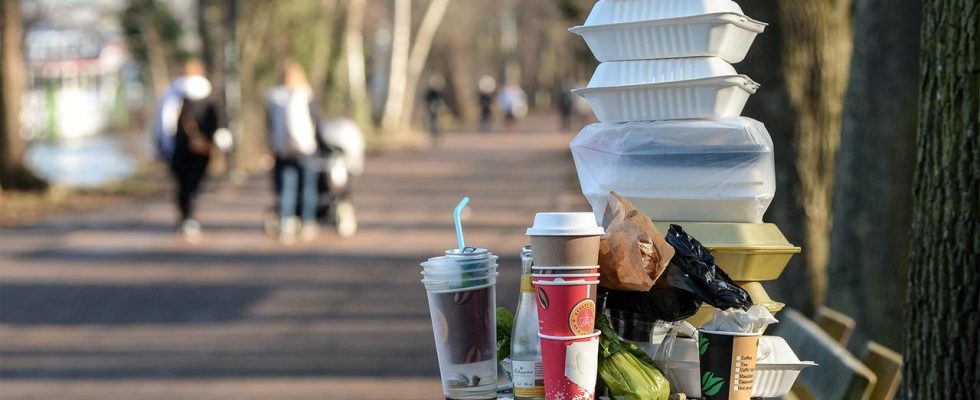Waste from single-use packaging is a problem for many municipalities. Tübingen was the first city to introduce a packaging tax. After a court confirms legality, other cities could follow.
Disposable packaging accounts for more than 40 percent of street waste. According to the association of municipal companies, the disposal of packaging and cigarette butts costs more than 700 million euros every year. These are huge sums of money, but above all the huge mountains of rubbish that are created as a result. David Fischer from Düsseldorf has now started a petition that his hometown will also introduce a packaging tax. More than 1,200 signatures have been collected so far.
Tübingen has proven that this tax can be implemented. Since the beginning of 2022, 50 cents each for disposable tableware and packaging and 20 cents for disposable cutlery have been due there, but no more than 1.50 euros per “single meal”. The sellers of the food and drinks have to pay, according to the city there are around 440 companies in Tübingen.
Companies are switching to reusable tableware
In the meantime, the city draws a positive balance. “For us, the control effect of the packaging tax is particularly evident in the significantly increased number of companies in Tübingen that now offer reusable tableware,” says the city’s spokeswoman, Claudia Salden.
However, according to Salden, there are no figures on the changed volume of packaging waste, as these are not recorded separately. However, the employees of the municipal service companies who empty the garbage cans reported “visibly less packaging waste from disposable packaging in and around the garbage cans”.
Fast food company has filed a lawsuit
Enforcing the tax was not easy. The operator of a McDonald’s branch in Tübingen – supported by the fast food group – had sued against the municipal packaging tax statute. McDonald’s was still in the lower court at the Administrative Court in Mannheim enforced. Tübingen had appealed against this judgment. The Federal Administrative Court in Leipzig confirmed the legality of the tax in May.
This motivated David Fischer to start the petition in Düsseldorf. “The packaging tax in Tübingen is still unique in Germany. But the Federal Administrative Court has now cleared the way for all other cities and communities: The local packaging tax is legal. We therefore urgently appeal to the city of Düsseldorf to take action against the throwaway culture and to the people of Tübingen Model to follow!”, it says in the text of the petition.
Bamberg, Nuremberg and Munich could follow suit
The German Environmental Aid welcomes this step. After the judgment of the Federal Administrative Court, she herself started an action and asked citizens to submit applications to municipalities and cities and to follow the example of Tübingen. So far, more than 2,100 applications for a municipal one-way packaging tax have been submitted to cities and municipalities, reports Thomas Fischer, Head of Circular Economy. “Most submissions came from Berlin, Cologne and Munich,” says Fischer.
According to the German Environmental Aid, 5.8 billion disposable beverage cups and 4.3 billion disposable lunch boxes are used in Germany every year. “In relation to the population, Tübingen has the most reusable catering establishments in Germany,” Fischer sums up.
Several cities are now considering introducing the packaging tax. According to the second mayor, Jonas Glüsenkamp, it should be clear in Bamberg by the end of the year how the packaging tax can be implemented. He had even met with Tübingen’s Mayor Boris Palmer to talk about the implementation there. Nuremberg is also considering introducing a packaging tax. And with Munich, a city with a population of more than a million is also open to such a tax. According to the assessment of the city treasury, an introduction is legally possible, said a spokeswoman.
Environmental aid calls for a national solution
The German environmental aid demands that a nationwide solution is needed. It cannot be a permanent solution that municipalities have to go beyond national guidelines because they are too weak: “In order to curb the flood of waste everywhere, we need a nationwide regulation to make disposable packaging for drinks and food more expensive. Specifically, we are calling for a nationwide one-way Tax on to-go packaging of at least 20 cents,” says Fischer.
Claudia Salden from the Tübingen city administration reports that the feedback on her packaging tax has been positive so far: “Many Tübingen residents share the goal of avoiding waste.” In the cityscape you can see more and more people who are out and about during their lunch break with their own box or a box from a reusable provider.
The exact amount of income from the tax can only be said after the first tax assessment. “According to a first rough estimate, we assume a higher six-digit amount,” says Salden. In addition to financing the disposal of rubbish in public spaces, the proceeds are to be used for other environmental protection measures relating to rubbish.

